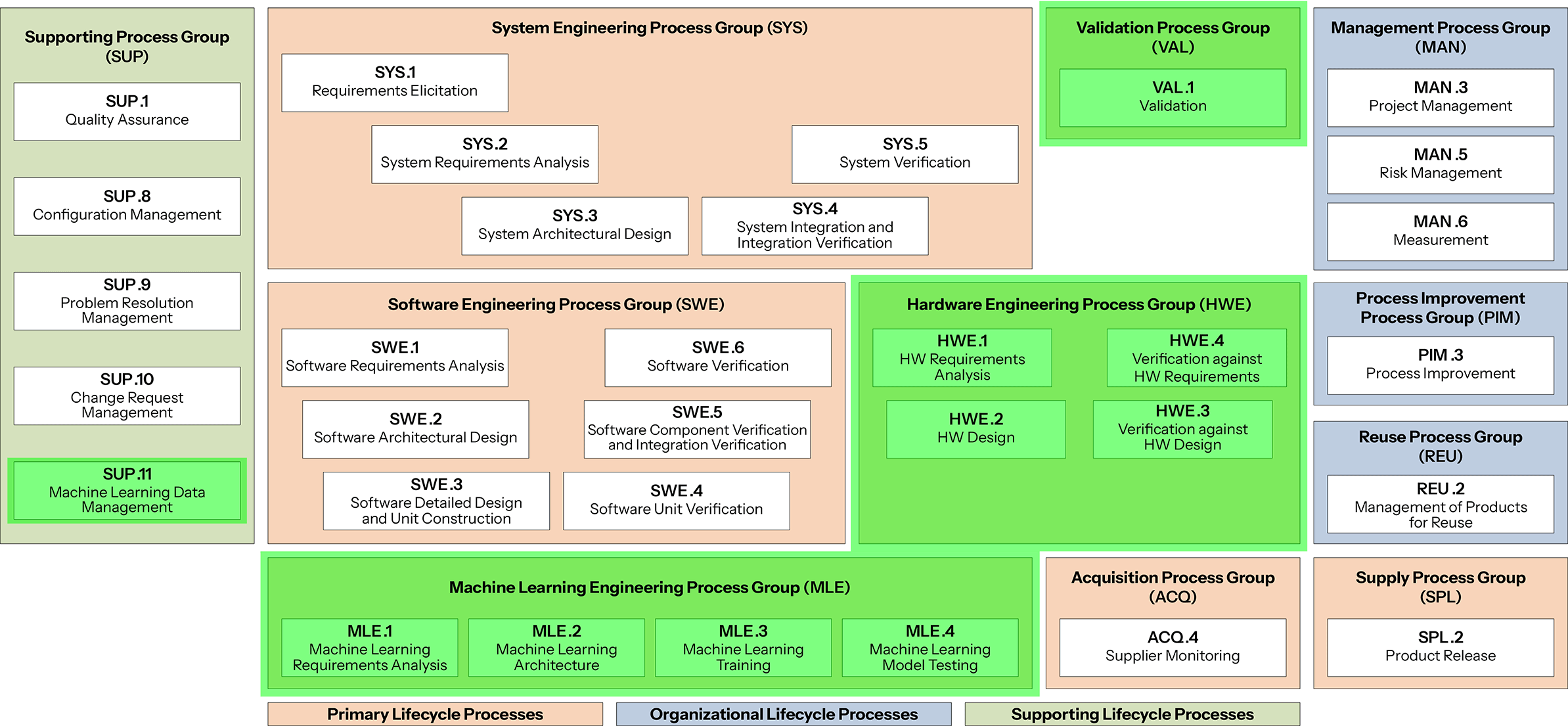1 min read
What is ASPICE in Automotive?
ASPICE - What it Means for Automotive Automotive Software Performance Improvement and Capability Determination (ASPICE) as a standard provides the...
5 min read
 Steve Neemeh
:
Apr 9, 2024 11:07:33 AM
Steve Neemeh
:
Apr 9, 2024 11:07:33 AM

LHP’s proven process for forging a turnkey systems and software development solution helps to create a perfect environment for implementing the Automotive Software Process Capability dEtermination (ASPICE) framework. Why? Because the ASPICE standard provides a methodology and guiding principles for engineers and developers to create a process in the first place, and LHP knows best how to navigate and optimize it.
Original equipment manufacturers (OEMs) and their suppliers rely on these frameworks to control the quality of their software and associated mechatronic systems as the vehicles they produce increasingly rely on software to regulate every conceivable function and feature. ASPICE is a widely accepted standard but can pose ramp-up challenges for organizations unfamiliar with the process. A solution developed to the ASPICE standard, and its attendant assessment framework, helps improve the quality of our customer’s entire system and software development across the entire lifecycle. This helps our customers eliminate errors and manage their projects better, to help ensure that their results are appropriate, meet their customers’ specifications, and have the best chance of being free of major defects.
The ASPICE standard presents proper avenues to verify and prove the quality of the finished product, aiding both OEMs and their suppliers in finding what areas to improve next. ASPICE revision 4.0 was released in December 2023. The standard has always provided some sort of process-defining framework. Revision 4.0 of the standard brings many improvements that provide new, streamlined process assessment models for not only hardware engineering but also machine learning. With these improvements, ASPICE is positioned to chart the full extent of present and future mechatronic process development. LHP brings that power to our customers most efficiently and painlessly, at whatever level of compliance they require.
To implement the ASPICE standard’s assessment framework in a turnkey solution, LHP’s engineers become experts in the standard, as well as all related guidance manuals and additional technical bulletins. They then distill the core required competencies to live documents or models which our customer’s engineering team can use as guideposts for setting up an excellent, standard-compliant development process.
Because LHP’s process is certified, a customer can in turn receive a UL-certified ASPICE process direct from LHP. These processes not only fulfill the customer’s present requirements, but they can also be set up to guide the customer through certifying their own processes. LHP’s turnkey solution matches an organization’s compliance level and assessment requirements, and gets the process moving in the right direction for rapid compliance. From there, should the need arise, LHP has the expertise to support our customers in implementing these processes as well.
The basic underpinnings of ASPICE have remained stable for over a decade, even with the updates, added features, and increased efficiencies presented in the most recent revision (ASPICE 4.0). ASPICE is not only a tool for creating software development processes; the framework and its attendant assessment models are also exceptional for identifying improvement opportunities in both new and “legacy” processes.
The standard lays out a framework for not only defining and implementing but also evaluating a system or software product’s development process. ASPICE has been adopted by multiple original equipment manufacturers (OEMs), and ASPICE compliance is often required of those OEMs’ suppliers, as well. The standard is also an effective tool for encoding industry-best practices for development process implementation. Based on the wide need for knowledge about it, and the advantages inherent in implementing it, the ASPICE framework was a natural choice for LHP to leverage into a turnkey solution that can rapidly bring an organization’s development processes up to speed.
The ASPICE framework still works on an outline of reference and assessment models to determine and evaluate both the required and the evident capabilities of a process under assessment. Both the required and evident capabilities of a process under assessment can be expressed in levels, from 1 to 5; the difference between the capability level needed and what is revealed in the assessment shows both quantity and specific areas, where improvement is needed.
Another facet of ASPICE that has been useful over the years is the “plug‑in” concept which also existed in the ASPICE parent standard, the ISO+IEC 33001 family. This powerful concept has been part of ASPICE since at least Version 3.1 (2016). With plug-ins, a developer can add an “external” engineering discipline, or a discipline from outside the usual scope of ASPICE, with its attendant specific processes, to the project’s assessment scope. What has changed about plug‑ins with ASPICE 4.0 is that the Machine Learning and Hardware Engineering domains are now simply part of the ASPICE scope, and don’t have to be “plugged in.” The fundamentals and nature of ASPICE remain stable, but it is continuously improved.
LHP, Inc. is a technology and services integrator, providing solutions for everything from consulting and engineering capacity needs to electric vehicle testing and functional safety. Our expert engineers possess a thorough and accurate grasp of the ASPICE standard, which we then leverage to apply our turnkey ASPICE-compliant process solution for the benefit of our client systems and software developers. This solution can be dropped into an existing development project efficiently. It typically needs very little customization, and usually has short learning periods because LHP has designed it to be robust, simple to learn, and easy to use.
LHP’s solution is also applicable to a wide range of organizations and situations. A turnkey process solution like the one LHP offers provides some of the fastest and most cost-effective ways to get an ASPICE or ISO 26262-compliant project moving forward rapidly, efficiently, and with greater cost-effectiveness.
We call our development protocol “turnkey” because the process solution that we produce for the mechatronic system of our customers is ready to be put right into service to guide their development project. Much like a custom car builder might tell his customers that all they need to do is to turn the key and go racing – in this case, our customers can go efficiently right to market with a quality product. Rather than enduring the pain, expense, and risk of trying to develop a solution from scratch, our turnkey solution is far better. Our customers’ products can be made safer, more efficient, and more competitive.
Often, a new software or systems development company will come to LHP with an identified need for ASPICE compliance. Sometimes this is a case of a brilliant design or technological innovation driving the launch of a new business venture, but then the innovators quickly realize that their customers require more formal process development and documentation. They struggle to weave their new innovative product into the existing business realm.
Alternatively, we also see a need for supporting innovation in established organizations that have been supplying high quality products to their customers for years. Software developers may already have mature processes in place that are not necessarily ASPICE-compliant, and they might only need a little help to step up to the next level and meet those requirements.
Either way, these organizations recognize the need for ASPICE compliance, but aren’t sure where to begin. This is where LHP comes to the rescue. LHP’s turnkey solution helps in all these cases by providing the rapid ramp-up capability of a well-developed and fully supported certified solution.
LHP’s standardized turnkey solution provides our customers with a roadmap for their products’ development process. It support customers’ development processes throughout their life cycle. LHP helps customers learn how to manage the processes, and the projects, in which they develop their embedded control systems. Within the turnkey solution is information, even example process models, for how to run a proper ASPICE-compliant software or system development process.
Another case often encountered is when an organization has developed a good product and their customers are happy, but they want to grow, or their customers may have come back to them with a new requirement for enhanced software capability. The mechatronic technology in our automotive industry is becoming more complex and demanding all the time. Often an OEM or a Tier 1 supplier will determine that a portion of their software requires improvement, and this mandate can have a trickle-down effect on their other suppliers and developers.
LHP’s turnkey solution easily allows for scaling in both the size of the organization, and the complexity and quantity of projects under development. Beyond this, a move from, for example, Level 1 capability compliance to Level 2, 3, or beyond, is also usually quite possible. LHP may hold a workshop and perform assessments to find the exact process changes needed and make recommendations for solutions from there.
LHP’s robust turnkey process solution leverages our engineering expertise and resources to help organizations build ASPICE-compliant processes and manage their systems and software projects with a scalable, rapid deployment focused on core competency, reduced risk, and cost efficiency.

1 min read
ASPICE - What it Means for Automotive Automotive Software Performance Improvement and Capability Determination (ASPICE) as a standard provides the...

LHP’s Safety Supervisor Software for Smart Vehicle Platforms Introduction As the automotive industry accelerates toward smart vehicle architectures,...

Why is Safety at the Core of Software-Defined Vehicles? Creating technology can be a complicated and time-consuming process. At LHP Engineering...